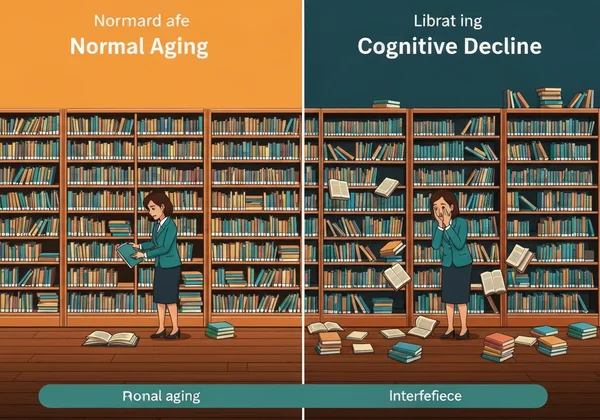Cognitive Health in Aging: Proactive Brain Health for Seniors
November 20, 2025 | By Gideon Albright
As we journey through our golden years, it's natural to notice changes in our bodies and minds. We might misplace our keys more often or struggle to recall a name that once felt so familiar. These moments can be unsettling, leading us to wonder about our cognitive health. But what if we could shift our perspective from one of worry to one of empowerment? Understanding and proactively managing our brain health is one of the most powerful steps we can take to ensure a vibrant, fulfilling later life. The key question many of us ask is, How do you tell if you have cognitive decline?
This guide, crafted by experts in neuroscience and AI, aims to provide clarity and actionable insights into the world of cognitive health in aging. We are dedicated to demystifying the brain's complexities and demonstrating how simple, consistent efforts can yield profound benefits. We will explore the difference between normal age-related changes and signs that may warrant attention, discuss powerful lifestyle strategies, and see how modern tools can help you understand your unique cognitive profile. Taking charge of your brain health begins with knowledge. Discover your cognitive strengths with our AI-powered cognitive assessment.

Understanding Cognitive Changes: Normal Aging vs. Concern
The first step in proactive brain care is learning to distinguish between what is typical and what might be a sign of something more. Fear and misinformation can often cause unnecessary anxiety. By understanding the nuances of cognitive aging, you can approach your health with confidence and clarity.
What is "Normal" Age-Related Forgetfulness?
As the brain ages, some processing speeds naturally slow down, and it can take longer to learn new information or retrieve old memories. This is a normal part of life. Think of it as your brain’s vast library becoming so full that the librarian needs a little extra time to find the right book. Examples of age-related forgetfulness include:
- Occasionally forgetting where you left your glasses or keys.
- Sometimes struggling to find the right word in a conversation.
- Forgetting an appointment but remembering it later.
- Becoming more easily distracted than you used to be.
These "senior moments" are typically not disruptive to your daily life and are not usually a sign of a serious problem.
How to Tell If You Have Cognitive Decline: Early Warning Signs
In contrast, cognitive decline involves more significant and persistent memory changes and thinking challenges that interfere with daily activities. It’s important to pay attention to patterns rather than isolated incidents. Early warning signs can include:
- Memory loss that disrupts your life, such as asking for the same information repeatedly.
- Difficulty planning or solving problems, like struggling to follow a familiar recipe.
- Trouble completing familiar tasks at home or work.
- Confusion with time or place, such as losing track of dates or forgetting where you are.
- New problems with words in speaking or writing.
- Noticeable changes in mood and personality, like becoming unusually confused, suspicious, or anxious.
Differentiating Between Mild Cognitive Impairment (MCI) and Dementia
If you notice persistent changes, it's helpful to understand terms you might hear. Mild cognitive impairment (MCI) is an intermediate stage between the expected cognitive decline of normal aging and the more serious decline of dementia. A person with MCI has noticeable problems with memory or thinking skills but can still perform most daily activities. Importantly, not everyone with MCI goes on to develop dementia.
Dementia is an umbrella term for a severe decline in mental ability that interferes with daily life. Alzheimer's disease is the most common type. The key difference is the severity of the symptoms and their impact on a person's independence. Recognizing these distinctions empowers you to have more informed conversations with healthcare providers and to seek a deeper understanding of your cognitive state.

Essential Steps for Preventing Cognitive Decline
While we cannot stop the clock, a wealth of scientific evidence shows that we can take powerful steps to protect our brain health. Proactive measures can significantly lower the risk of cognitive decline and enhance our mental vitality for years to come. Think of these strategies not as chores, but as investments in your future well-being.
Lifestyle Pillars: Diet, Exercise, and Quality Sleep
Your brain is deeply connected to your body, and what’s good for your heart is fantastic for your head. These three pillars form the foundation of a brain-healthy lifestyle.
- Brain-Healthy Diet: Focus on a diet rich in fruits, vegetables, whole grains, and lean proteins, like the Mediterranean diet. Foods high in omega-3 fatty acids (like fatty fish), antioxidants (like berries), and flavonoids (like dark chocolate) are particularly beneficial for protecting brain cells.
- Regular Exercise: Physical activity increases blood flow to the brain, which delivers vital oxygen and nutrients. Aim for at least 150 minutes of moderate-intensity exercise per week, such as brisk walking, swimming, or cycling.
- Quality Sleep: Sleep is when your brain clears out toxins and consolidates memories. Aim for 7-9 hours of restful sleep per night. Establishing a consistent sleep routine can make a world of difference.
The Power of Social Engagement and Mental Stimulation
Your brain thrives on novelty and connection. Staying engaged is like a workout for your cognitive muscles, building resilience and flexibility.
- Stay Socially Active: Meaningful social connections help combat stress and depression, both of which are risk factors for cognitive decline. Make time for friends, family, or community groups.
- Embrace Mental Stimulation: Challenge your brain regularly. Learn a new skill, take up a hobby, play strategy games, read books, or do puzzles. The key is to find activities that are both enjoyable and require you to think.
Managing Health Conditions and Medications Effectively
A holistic health approach is critical for cognitive longevity. Chronic conditions can take a toll on your brain if left unmanaged.
-
Control Cardiovascular Risks: High blood pressure, high cholesterol, and diabetes are strongly linked to an increased risk of cognitive decline. Work with your doctor to manage these conditions effectively.
-
Review Medications: Some medications can have side effects that impact memory and thinking. Regularly review your prescriptions and over-the-counter drugs with your healthcare provider to ensure they are not negatively affecting your cognition.

The Role of Elderly Cognitive Assessment in Brain Health
In the past, understanding one's cognitive function was a process shrouded in clinical mystery. Today, technology has empowered us to take a more active role. An elderly cognitive assessment is no longer just for when problems arise; it is a powerful tool for proactive brain health management, helping you establish a baseline and track your progress over time.
Why Consider a Cognitive Assessment as You Age?
Just as you monitor your blood pressure or cholesterol, monitoring your cognitive health provides invaluable information. Taking an assessment can help you:
- Establish a Baseline: Get a clear snapshot of your cognitive function right now. This baseline makes it easier to track changes over time.
- Identify Strengths and Weaknesses: Understand which of your proactive steps are working and identify areas that might need more attention.
- Empower Doctor Conversations: A detailed report provides objective data that you can share with your doctor, leading to more productive and informed discussions about your health.
- Reduce Anxiety: A clear understanding of your cognitive profile can alleviate the anxiety that comes from uncertainty and help you focus on positive actions.
How Our AI-Driven Online Assessment Provides Deeper Insights
Traditional cognitive tests can be time-consuming and offer limited feedback. Our AI-driven platform leverages the power of artificial intelligence to provide a comprehensive and nuanced evaluation of your cognitive skills. Our clinically-informed assessment goes beyond simple right-or-wrong answers. The AI analyzes your response patterns, timing, and consistency to deliver personalized insights into key areas like memory, attention, and executive function. This modern approach offers a level of detail that helps you truly understand your brain's unique wiring. You can take a cognitive test from the comfort of your home.
Understanding Your Results and Planning Next Steps
Receiving a report about your cognitive function shouldn't be intimidating. Our goal is to provide clarity, not a clinical diagnosis. Your personalized report will translate complex data into easy-to-understand strengths, challenges, and actionable recommendations. This information serves as your personal roadmap for enhancing your cognitive well-being. It empowers you to tailor your lifestyle changes, focusing on the strategies that will benefit you most, and helps you move forward with a concrete plan for a healthier brain.

Empowering Your Journey to Lifelong Brain Health
Embracing the aging process with vitality and confidence means taking an active role in managing your cognitive health. It’s about understanding that small, consistent choices in diet, exercise, and mental engagement can build a more resilient and vibrant brain. Forgetting where you put your keys can be a normal part of life, but having the tools to understand the difference between a minor lapse and a potential concern is truly empowering.
Your cognitive profile is unique, and you deserve personalized insights. An AI-powered assessment can provide the clarity you need to take meaningful action. Don't let uncertainty hold you back. Begin your journey toward a deeper understanding of your mind today.
Explore our comprehensive resources and begin your free cognitive assessment. Your brain will thank you for it.
Frequently Asked Questions About Cognitive Health in Aging
How can I check if my brain is working properly at home?
You can start by observing your daily life. Are you able to manage your finances, follow recipes, and keep appointments without difficulty? You can also engage in brain-stimulating activities like puzzles or learning a new language. For a more structured and objective measure, our online assessment offers a comprehensive way to evaluate key cognitive domains from home.
At what age should you consider having a cognitive test?
There is no magic number, but it’s a good idea for adults over 50 to establish a baseline, especially if they have a family history of cognitive issues or are noticing changes themselves. Proactively monitoring your cognitive health from middle age onward can help you track changes and implement beneficial lifestyle habits early.
What happens if an elderly cognitive assessment suggests concerns?
An assessment that highlights areas of concern is not a diagnosis. It is a valuable piece of information that provides a starting point for a conversation with your doctor or a qualified healthcare professional. The report can guide you and your doctor toward the right next steps, which may include further evaluation or specific lifestyle recommendations.
Can lifestyle changes truly prevent cognitive decline?
While there are no guarantees, a vast body of scientific research strongly suggests that lifestyle factors play a major role in brain health. Regular physical exercise, a balanced diet, active social engagement, and continuous mental stimulation can significantly lower your risk of cognitive decline and help maintain your brain's function and vitality as you age.